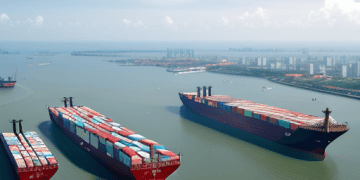As global demand for environmentally friendly products and services grows, Vietnamese logistics companies are focusing on the green transformation of their industry. This shift is essential to meet both domestic and international expectations, as consumers and businesses increasingly prioritize sustainability.
Associate Professor Dr. Tạ Văn Lợi, Principal of the School of Business at the National Economics University, discussed the key steps for Vietnamese enterprises to become more sustainable in logistics in a recent interview with the Vietnam News Agency. He highlighted the importance of adapting infrastructure and services to be more eco-friendly, aligning with international standards set by global agreements such as COP26.
Vietnam has committed to reducing methane levels by 30% by 2030 and reaching net-zero emissions by 2050. To achieve this, the logistics sector must green its infrastructure, including transport systems and related services such as packaging and customs declarations. These changes align with the country’s goal of phasing out fossil fuel projects and encouraging sustainable practices.
Dr. Lợi noted that while Vietnam has favorable natural resources—such as forests and rivers for transportation, and alternative fuels like ethanol—there are several challenges to achieving green logistics. A significant barrier is the lack of capital for the green transformation, as well as insufficient management experience in the logistics sector. Additionally, technological advancements in other countries, such as hydrogen-powered engines in Europe and electric vehicles in China, present challenges for Vietnam’s progress in greening its logistics industry.
With nearly 83,000 logistics businesses in Vietnam, most of them are small and medium-sized enterprises (SMEs), which face significant hurdles. These include limited access to capital, a lack of technological support, and insufficient connectivity between companies to implement the green transformation.
To address these issues, Dr. Lợi emphasized the need for synchronization between the state and business sectors. He suggested the development of a clear roadmap, with key steps and breakthroughs, including the creation of logistics cities that integrate green infrastructure. Furthermore, he called for the establishment of mechanisms for green procurement and the prioritization of green products.
The Vietnamese government is also encouraged to issue laws and policies promoting green logistics, while businesses and consumers must prioritize the use of sustainable products and services. Industry associations can play a vital role in fostering connections and ensuring that logistics companies remain aligned with evolving global standards for green transformation.
As Vietnam works towards these goals, the green logistics shift presents both challenges and opportunities for the country’s logistics sector, which is integral to meeting future environmental and economic demands.
Stay informed with supply chain news on The Supply Chain Report. Free tools for international trade are at ADAMftd.com.
Here’s the list in one line and italicized:
#GreenLogisticsVietnam #SustainableSupplyChains #VietnamEcoTransformation #LogisticsSustainability #GreenTradeSolutions















